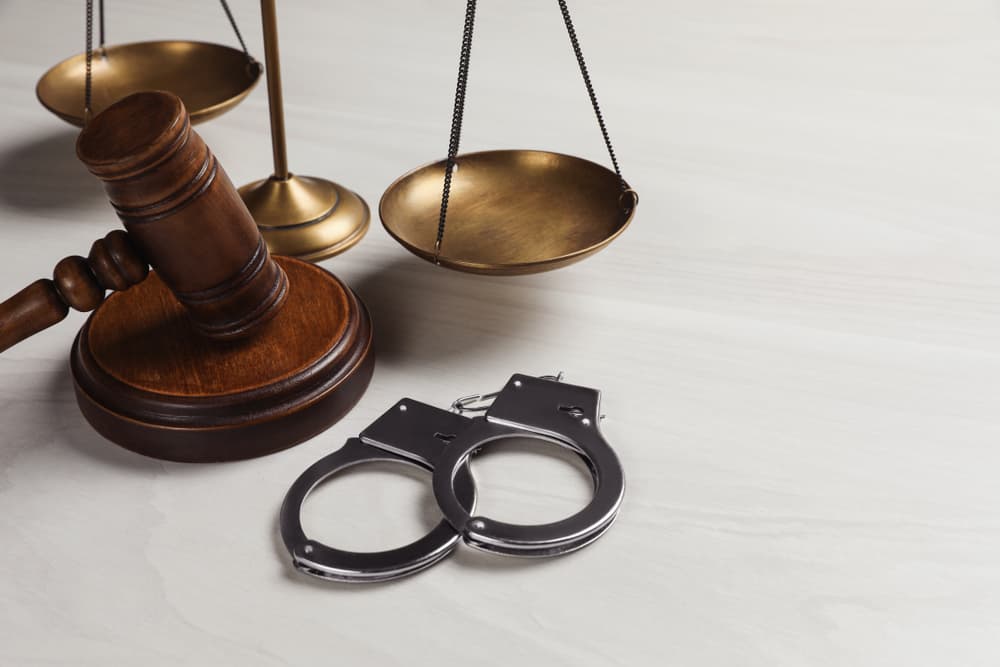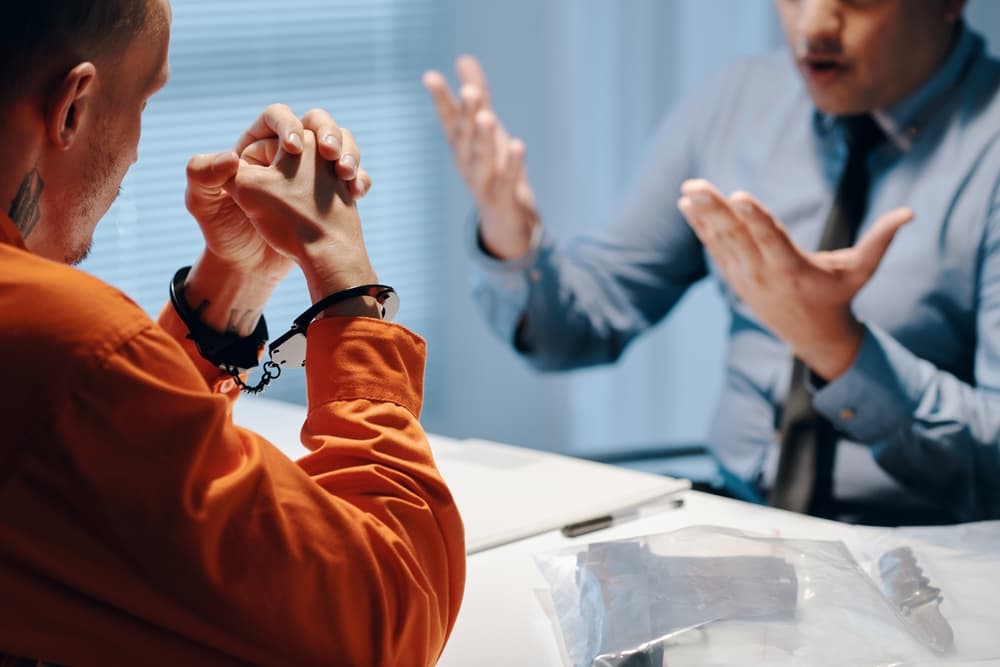Being arrested and charged with a crime is a very scary process. If you are currently pending one or more criminal charges, you want a knowledgeable criminal defense attorney by your side as soon as possible. A lawyer can safeguard your legal rights throughout the process and ensure that they remain protected.
Before and after retaining a criminal defense lawyer, you should ask several important questions. That way, you have the best chance of obtaining a favorable result in your case.
What Is the Criminal Legal Process?
In general, the criminal legal process involves several stages. It begins with an investigation by law enforcement, whereby law enforcement collects evidence to determine if a crime has been committed and who may be responsible. If there is enough evidence, the accused is arrested and taken into custody.
Following the arrest, the accused (defendant) goes before a judge for an initial appearance. During this appearance, the judge informs the accused of the charges against them and their rights, including the right to an attorney. If the accused cannot afford an attorney, the court will appoint one for them.
Next, a preliminary hearing may be held to determine if there is enough probable cause to proceed with the case. This is where the prosecution presents evidence and witnesses to demonstrate that a crime was likely committed and that the accused likely committed it.
If the case proceeds, the next step is arraignment, where the accused formally enters a plea of guilty or not guilty. If they plead guilty, the case may proceed to sentencing. If they plead not guilty, the case moves to trial.
During the trial, both the prosecution and the defense present evidence and arguments to a jury, who then decides the defendant’s guilt or innocence. The prosecution must prove the defendant’s guilt beyond a reasonable doubt.
If the jury finds the defendant guilty, the judge sentences them. Sentencing can range from fines and probation to imprisonment, depending on the severity of the crime and other factors, such as the defendant’s criminal history.
After sentencing, the defendant may have the option to appeal the verdict or sentence. This involves asking a higher court to review the trial proceedings for legal errors that may have affected the outcome.
Throughout the process, the defendant has certain rights guaranteed by the Constitution, including the right to remain silent, the right to confront witnesses, and the right to a fair and impartial trial.
The criminal legal process is designed to ensure that those accused of crimes are given a fair chance to defend themselves and that justice is served. A knowledgeable criminal defense attorney can guide you through the process and work to obtain the best possible result in your case.
What Does the Government Need to Prove in a Criminal Case?
In a criminal case, the government, represented by the prosecution, must prove the defendant’s guilt beyond a reasonable doubt. This is a high standard of proof, requiring the jury to be firmly convinced that the defendant committed the crime. To secure a guilty verdict, the prosecution needs to establish several key elements of the crime. These elements vary depending on the specific offense but generally include:

- Actus Reus — The prosecution must prove that the defendant committed a prohibited act. This can be an action, such as theft or assault, or a failure to act when there was a legal duty to do so, such as failing to provide necessary care to a dependent.
- Mens Rea — In addition to proving the act itself, the prosecution must demonstrate that the defendant had a guilty state of mind, or intent, at the time of the offense. This can involve showing that the defendant acted purposefully, knowingly, recklessly, or with criminal negligence, depending on the requirements of the specific crime.
- Causation — The prosecution must establish a causal connection between the defendant’s actions and the harm caused. This means showing that the defendant’s conduct was the direct cause of the illegal outcome.
- Concurrence — In some cases, the prosecution must demonstrate that the defendant’s guilty state of mind coincided with the prohibited act. This ensures that the defendant is held responsible for both their actions and their intentions.
- Lack of Legal Justification or Excuse — Finally, the prosecution must disprove any legal justifications or excuses that the defendant may raise. This can include self-defense, necessity, duress, or insanity, depending on the circumstances of the case.
Throughout the trial, the prosecution presents evidence and arguments to support these elements, while the defense may challenge the evidence and present its own case to undermine the prosecution’s arguments. Ultimately, it is up to the jury to weigh the evidence and decide whether the prosecution has met its burden of proof beyond a reasonable doubt.
Securing a guilty verdict in a criminal case requires the prosecution to carefully build a strong case based on credible evidence and persuasive arguments. However, the accused individual, or defendant, can raise one or more legal defenses in response to the pending charge(s). If a defense is successful, it may ultimately result in a complete dismissal of the case.
A knowledgeable criminal defense attorney in your area can determine your eligibility for asserting various legal defenses and can pursue an acquittal on your behalf.
How Can an Experienced Criminal Defense Lawyer Help with Your Case?
A skilled criminal defense attorney can be an invaluable asset when facing criminal charges. Several ways they can help with your case include the following:
- Legal Knowledge — A knowledgeable criminal defense attorney understands the intricacies of criminal law and procedures. They can navigate the legal system, protecting your rights so that you receive fair treatment throughout the process.
- Case Assessment — A defense attorney will carefully review the evidence against you and assess the strength of the prosecution’s case. They can identify weaknesses in the evidence or legal arguments and exploit them to your advantage.
- Defense Strategy — Based on their analysis of the case, a defense attorney will develop a strategic defense plan tailored to your specific circumstances. This may involve challenging the prosecution’s evidence, presenting mitigating factors, or negotiating a plea deal.
- Investigation — A defense attorney will conduct a thorough investigation into the circumstances surrounding your case. This may include interviewing witnesses, gathering evidence, and hiring experts to testify on your behalf.
- Pre-trial Motions — Before trial, a defense attorney can file various motions to suppress evidence, dismiss charges, or challenge legal issues. These motions can weaken the prosecution’s case or even result in the dismissal of charges.
- Trial Representation — If your case goes to trial, a skilled defense attorney will vigorously advocate for your innocence. They will cross-examine prosecution witnesses, present evidence and witnesses on your behalf, and deliver persuasive arguments to the jury.
- Negotiation Skills — In many cases, a defense attorney can negotiate with prosecutors to reach a favorable plea deal. This may involve reducing charges, minimizing penalties, or securing alternative sentencing options.
- Post-conviction Relief — If you are convicted, a defense attorney can continue to advocate for you during the sentencing phase and explore options for post-conviction relief, such as appeals or petitions for a new trial.
Hiring a knowledgeable criminal defense attorney can make a significant difference in the outcome of your case. Therefore, you should retain experienced legal counsel as soon as possible.
What Are the Most Important Questions to Ask a Criminal Defense Lawyer?
When choosing a criminal defense attorney, it is essential to ask the right questions to ensure you are making an informed decision and receiving the best representation possible. Here are some important questions to ask before retaining a defense attorney and throughout the representation process:
Before Retaining:
- Experience — Ask about the attorney’s experience handling cases similar to yours. Inquire about their success rate and track record in achieving favorable outcomes for clients facing similar charges.
- Approach — Learn about the attorney’s approach to handling cases. Do they prefer to negotiate plea deals, or are they willing to take cases to trial if necessary? Understanding their strategy can help you determine if they align with your goals.
- Communication — Clarify how the attorney will keep you informed about your case’s progress. Will they provide regular updates, and can you easily reach them with questions or concerns?
- Fees — Discuss the attorney’s fee structure upfront to avoid surprises later. Ask about their billing practices, including whether they charge a flat fee or bill by the hour, and inquire about any additional costs you may incur.
- Client References — Request references from past clients who can provide insight into their experience working with the attorney. Hearing from others who have been in your shoes can help you gauge the attorney’s professionalism and effectiveness.
While Representing:
- Case Strategy — Stay informed about the attorney’s strategy for your case. Ask about any developments or changes in approach, and make sure you understand the reasoning behind their decisions.
- Options and Consequences — Discuss the potential outcomes of your case and the implications of different legal strategies. A good defense attorney will help you understand your options and the possible consequences of each decision.
- Updates — Stay in touch with your attorney and ask for updates on any new developments in your case. Regular communication ensures that you are informed about important decisions and can provide input when necessary.
- Preparation — Inquire about the attorney’s preparation for court proceedings, including trial preparation if your case goes to trial. Make sure they are thoroughly familiar with the facts of your case and are prepared to present a strong defense on your behalf.
- Feedback — Provide feedback to your attorney about your concerns or preferences throughout the representation process. Open communication allows for a collaborative relationship and ensures that your attorney can address any issues promptly.
By asking these important questions before retaining a criminal defense attorney and throughout the representation process, you can ensure that you have the best possible legal representation and increase your chances of achieving a favorable outcome in your case.
Accepting a Plea Deal Versus Taking a Criminal Matter to Trial

Deciding whether to accept a plea deal or take a criminal case to trial is a significant decision that can have lasting consequences. Here’s what you need to know about each option:
Accepting a Plea Deal
A plea deal is an agreement between the defendant and the prosecution, where the defendant agrees to plead guilty or no contest to certain charges in exchange for concessions from the prosecution, such as reduced charges, lesser penalties, or dismissal of other charges.
Pros:
- Reduced Charges or Penalties — Plea deals often result in reduced charges or penalties compared to what a defendant may face if convicted at trial.
- Certainty — By accepting a plea deal, defendants can avoid the uncertainty and risk of a trial verdict and potentially harsher consequences.
Cons:
- Admitting Guilt — Accepting a plea deal requires the defendant to admit guilt, which may have personal or professional consequences.
- Limited Appeal Options — Defendants who accept plea deals generally have limited options for appealing their convictions compared to those who go to trial.
Taking a Criminal Case to Trial
Opting for a trial means presenting the case before a judge or jury, who will determine the defendant’s guilt or innocence based on evidence that both the prosecution and defense present.
Pros:
- Right to a Fair Trial — Defendants have a constitutional right to a fair trial, where the burden of proof is on the prosecution to prove guilt beyond a reasonable doubt.
- Opportunity To Challenge Evidence — Trials provide defendants with the opportunity to challenge the prosecution’s evidence and present their own case in defense.
Cons:
- Uncertainty — Trials are unpredictable, and the outcome is not guaranteed. Defendants risk being found guilty and facing potentially harsher penalties than those offered in a plea deal.
- Time and Expense — Trials can be time-consuming and expensive, requiring extensive preparation, court appearances, and legal fees.
At a criminal court trial, both the prosecution and the defense present evidence and arguments to the judge or jury. The prosecution typically presents its case first, including witness testimony, physical evidence, and legal arguments. The defense then has the opportunity to cross-examine prosecution witnesses, present its own evidence and witnesses, and make legal arguments in support of the defendant’s innocence. After both sides have presented their cases, the judge or jury deliberates and renders a verdict based on the evidence and the applicable law.
Contact a Knowledgeable Criminal Defense Lawyer in Your Area Today
If you are currently pending a criminal charge, it is important that you retain a skilled criminal defense law firm as soon as possible. Your lawyer can determine all of your legal options, formulate a legal defense on your behalf, represent you during plea deal or other negotiations, or advocate on your behalf in court. Your attorney will do everything they can to secure the best possible result in your criminal case.


